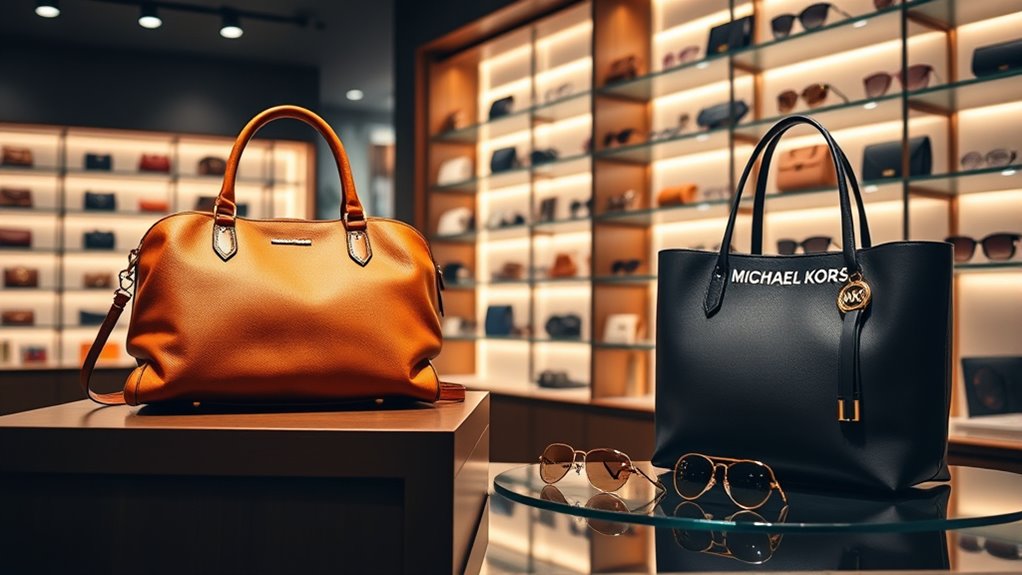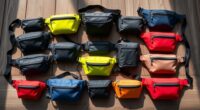Choosing between Coach and Michael Kors in 2025 depends on what you value most. Coach offers better material durability, a strong heritage, and higher luxury status, making it potentially a smarter long-term investment. Michael Kors provides trend-driven, accessible styles perfect for quick updates and casual wear. If you want a blend of style, quality, and future value, Coach might be your best option—stick around to uncover the details that can help you decide.
Key Takeaways
- Coach’s focus on durable materials and craftsmanship offers better long-term wear and resale value than Michael Kors.
- Coach’s commitment to sustainability and ethical sourcing enhances its brand reputation and perceived value.
- Michael Kors provides more affordable pricing and wider accessibility, appealing for budget-conscious consumers seeking trend updates.
- Coach’s iconic heritage and timeless designs sustain relevance, making its products more versatile and investment-worthy over time.
- Michael Kors’ rapid trend adaptation and seasonal updates attract quick fashion fixes, but may compromise long-term value.
Brand Heritage and Design Philosophy
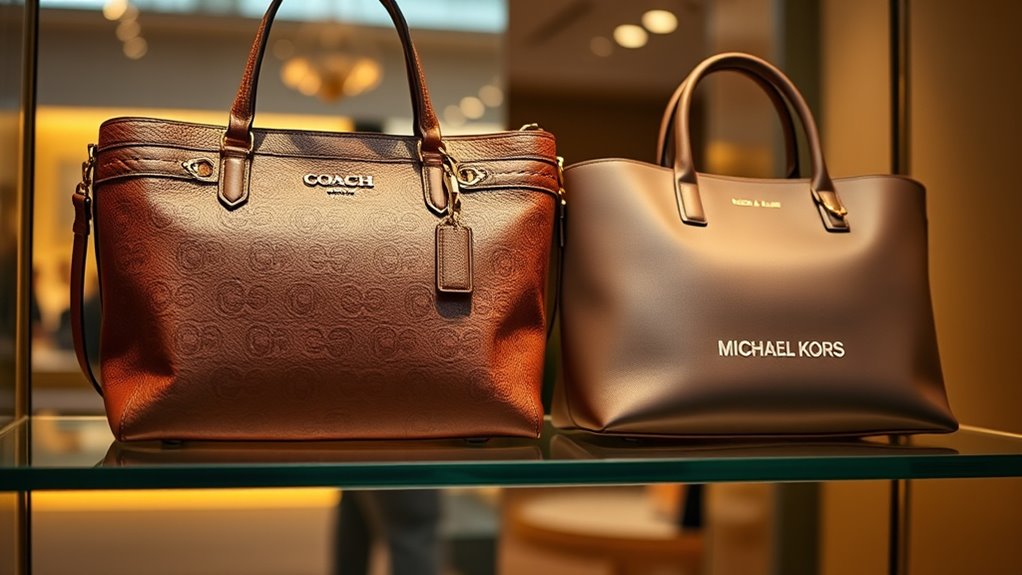
While both Coach and Michael Kors have established strong identities, their brand heritages and design philosophies differ markedly. Coach’s heritage storytelling centers on its American roots, craftsmanship, and leather mastery, emphasizing timelessness and durability. Its design innovation balances tradition with modern updates, blending heritage with contemporary flair. You’ll notice Coach’s focus on authentic storytelling through iconic logos, classic shapes, and rich materials that evoke a sense of heritage. Conversely, Michael Kors highlights a jet-set, luxury lifestyle, with a focus on polished, trend-driven styles. Its approach to design innovation leans toward accessibility and chic, everyday elegance. You see a more modern, fast-paced interpretation of luxury, making the brand appealing to those who seek current trends infused with a sense of glamour. Additionally, both brands are adapting to market growth projections by incorporating sustainable initiatives into their product designs and materials, reflecting their commitment to consumer preferences and future trends. Incorporating brand identity into their collections helps both brands stay relevant in a competitive landscape. A recent trend also emphasizes timeless appeal, guiding their collections to balance current trends with enduring style.
Price Range and Affordability
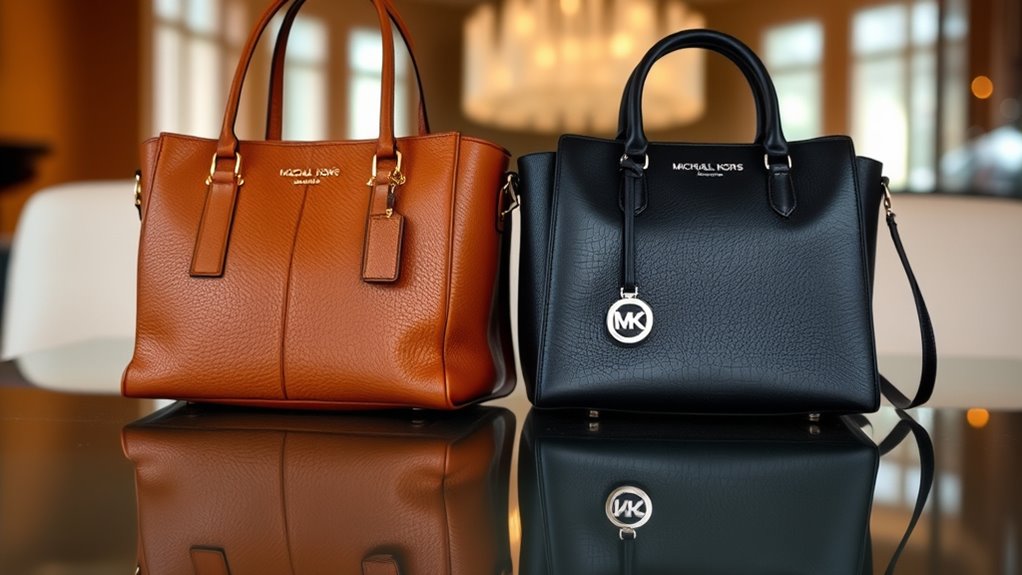
When comparing Coach and Michael Kors, their pricing strategies reveal distinct approaches to accessibility and luxury. Coach generally offers lower price points, making its products more affordable for budget-conscious shoppers. Michael Kors tends to have a wider price range, with some items more expensive but still within a mid-tier bracket. These pricing differences influence affordability factors, impacting your ability to get quality designs without overspending. Additionally, price flexibility can vary significantly depending on sales and seasonal discounts, which are often used as part of competitive pricing strategies to attract different customer segments. As the market demand for designer accessories shifts, both brands adapt their pricing to maintain relevance and appeal to a broad audience. Moreover, understanding value for money helps consumers assess whether the quality justifies the price differences between these brands.
Material Quality and Craftsmanship
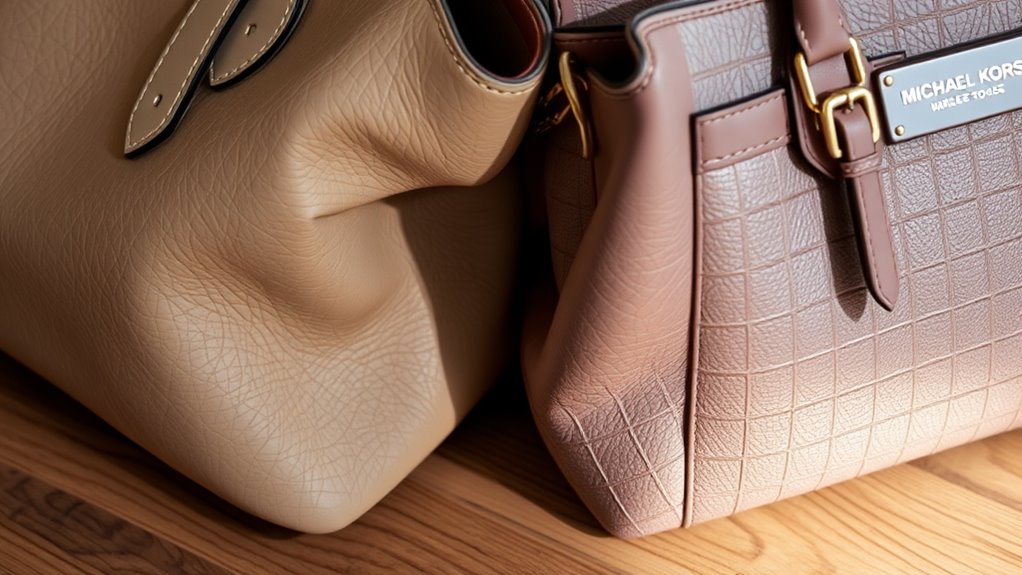
Material quality and craftsmanship are key factors that differentiate Coach and Michael Kors. When you evaluate leather durability, Coach often uses thicker, more resilient leather that ages well over time, providing longevity. Michael Kors, on the other hand, tends to focus on softer, more supple leathers that feel luxurious but may show wear sooner. Stitching precision is another essential aspect; Coach is known for meticulous stitching that enhances both durability and appearance, reflecting high craftsmanship standards. Michael Kors also maintains good stitching, but some pieces may have minor inconsistencies due to faster production cycles. Overall, if you prioritize leather durability and precise stitching, Coach generally offers a higher level of craftsmanship, making its products feel more solid and long-lasting.
Style and Trend Versatility
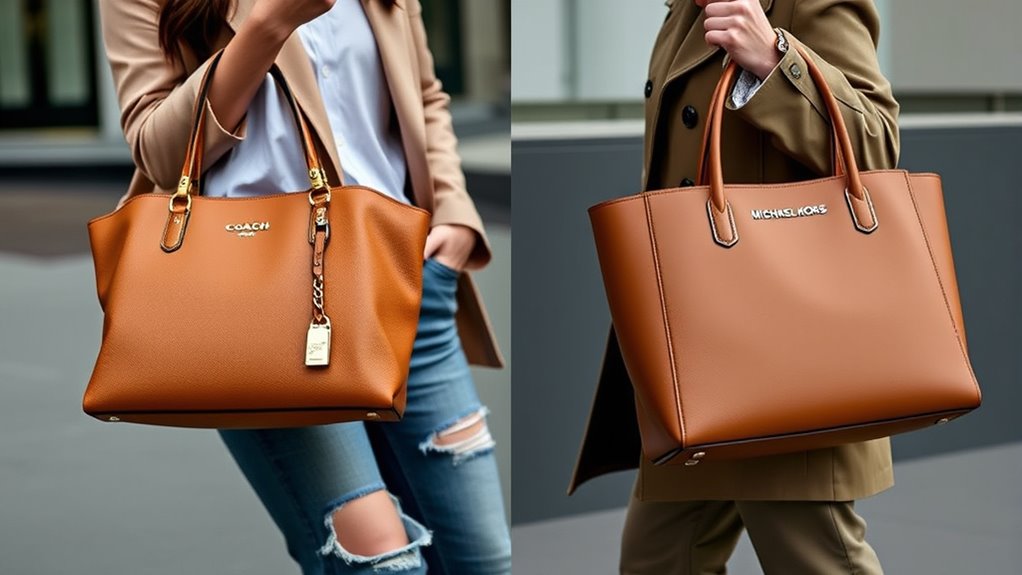
Both Coach and Michael Kors offer bags that adapt to changing trends, making them versatile choices for your wardrobe. You can mix and match their styles for both casual and formal looks, depending on your mood. This flexibility guarantees your accessories stay stylish over time without feeling outdated. Additionally, their regional popularity can influence your decision based on current fashion trends in your area. Their timeless design elements ensure that even as styles evolve, these brands maintain a consistent appeal that complements various fashion preferences. Moreover, the versatility of their designs allows for seamless integration into diverse wardrobe styles, enhancing their value. Considering the brand durability, both brands are known for producing bags that stand up to everyday use, adding to their long-term value. Their product quality standards further support their reputation for creating durable, well-crafted accessories that withstand regular wear.
Trend Adaptability Over Time
Coach has consistently demonstrated a strong ability to adapt to changing fashion trends, maintaining relevance across different eras. Its seasonal adaptability allows it to update designs for each season, ensuring your wardrobe stays current. The brand’s focus on color longevity means you can invest in pieces that remain stylish year after year, rather than quickly fading from trend. Coach’s designs often blend classic elements with modern touches, making them versatile for various looks and occasions. This ability to evolve while preserving core aesthetics makes Coach a smart choice if you want bags and accessories that stand the test of time. Additionally, Coach’s trend adaptability is supported by its capacity to incorporate sound healing science concepts into its creative processes, fostering innovative designs that resonate with contemporary tastes. Its capacity for trend evolution ensures that even as styles change, Coach remains a relevant and fashionable brand. Moreover, its commitment to quality craftsmanship ensures durability and long-term value, reinforcing its appeal for thoughtful consumers. This ongoing innovation not only helps it stay ahead of trends but also appeals to consumers seeking versatile style options that can transition seamlessly from casual to formal settings. Incorporating natural elements into designs can further enhance its timeless appeal. Ultimately, its trend adaptability over time helps you stay fashionable without constantly chasing fleeting trends.
Diverse Styling Options
Coach’s ability to blend classic and modern designs means you can create a wide range of looks with their bags and accessories. Their versatile styles allow you to experiment with color coordination, mixing bold hues or subtle shades for different outfits. You can easily pair a neutral bag with a vibrant dress or add a pop of color to a monochrome look. Pattern mixing becomes effortless, as Coach offers pieces that complement various prints and textures. Whether you prefer sleek, minimalist designs or more detailed, embellished options, you’ll find pieces that suit your style. This diversity gives you the freedom to adapt your accessories for any occasion, making Coach a smart choice if you want styling flexibility and trend versatility in your wardrobe. Additionally, Coach’s focus on cultural influences in fashion ensures their designs resonate with current global trends and diverse fashion narratives.
Customer Satisfaction and Brand Reputation
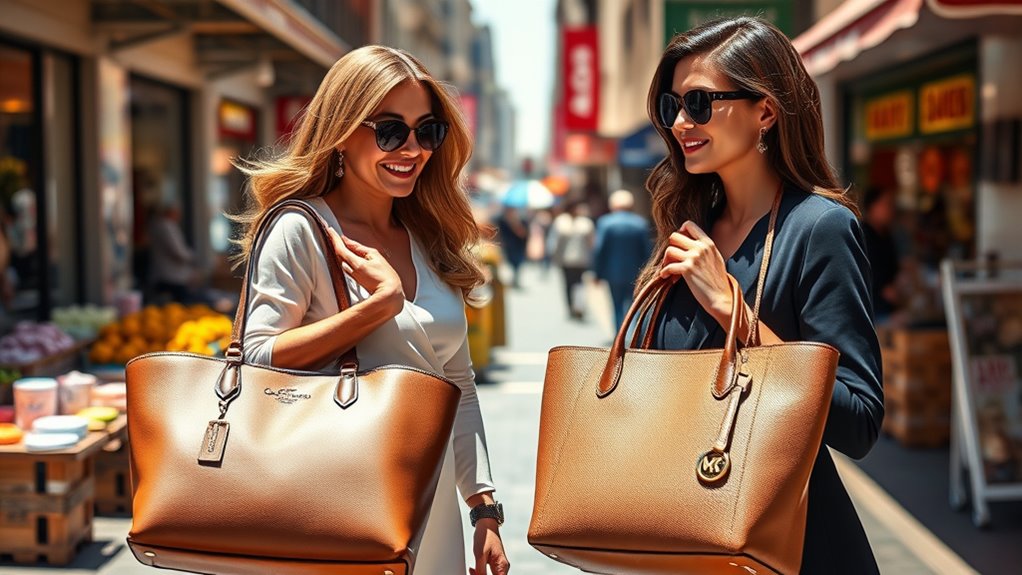
Your perception of a brand often hinges on customer satisfaction and how it’s viewed publicly. Loyalty indicators like repeat purchases and reviews reveal which brand truly resonates with consumers. By examining these trends, you can better understand how Coach and Michael Kors maintain their reputations. Additionally, consumer feedback on brand reputation management plays a significant role in shaping brand perception in the mid-tier designer market. Recognizing how brand appeal influences customer loyalty can further clarify which brand delivers better value in 2025. Moreover, analyzing production quantity variance can provide insights into operational efficiency and product availability that impact customer satisfaction and brand trust. Understanding consumer perception can also shed light on how effectively each brand manages its public image and responds to market expectations.
Brand Loyalty Indicators
Customer satisfaction and brand reputation are key indicators of loyalty that can considerably influence a company’s success. When you see strong celebrity endorsements and positive social media influence, it’s a good sign customers feel connected and trust the brand. High satisfaction levels often lead to repeat purchases and brand advocacy, boosting loyalty. Both Coach and Michael Kors leverage celebrity partnerships to enhance their image, but their social media presence varies in impact. If customers consistently praise product quality and brand experience online, it reflects well on reputation. You can gauge loyalty by looking at online reviews, engagement rates, and how often customers recommend these brands. Ultimately, a positive perception driven by endorsements and social media buzz keeps customers loyal and helps brands stay competitive.
Public Perception Trends
Celebrity endorsements and social media buzz shape how consumers perceive brands like Coach and Michael Kors. These trends heavily influence customer satisfaction and overall brand reputation. When a celebrity is spotted carrying a bag or endorsing a product, it boosts credibility and desirability. Social media influence amplifies this effect, creating instant buzz and shaping public opinion. You’ll notice that:
- Brands associated with popular influencers tend to see higher positive perception
- Authenticity in endorsements increases trust among consumers
- Social media campaigns can quickly improve or damage reputation
- User-generated content impacts brand perception more than traditional advertising
- Consistent online engagement fosters stronger customer loyalty
Availability and Accessibility
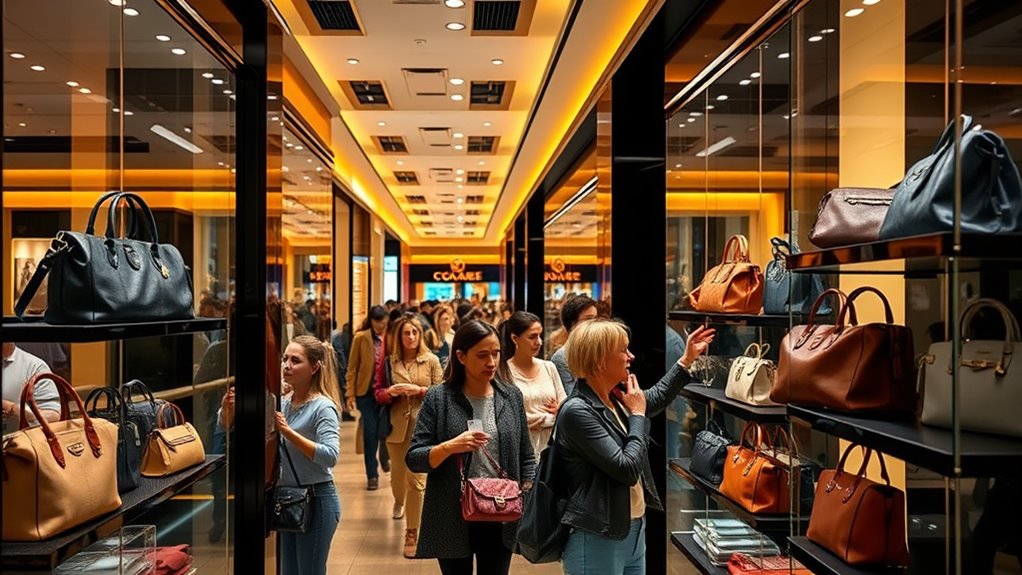
When comparing Coach and Michael Kors, their availability and accessibility play a significant role in shaping your choices. Coach maintains a sense of luxury exclusivity with carefully curated retail locations, often placing stores in high-end malls and flagship areas. This can make the brand feel more exclusive, but it might also limit your options for quick access. Michael Kors, on the other hand, focuses on widespread retail presence, including department stores and outlet locations, making their products more accessible and easier to find. Their global reach ensures you can shop conveniently both online and in physical stores. If convenience and broad accessibility matter most to you, Michael Kors offers a more approachable experience. Conversely, if you value luxury exclusivity, Coach’s select retail locations may appeal more.
Sustainability and Ethical Practices
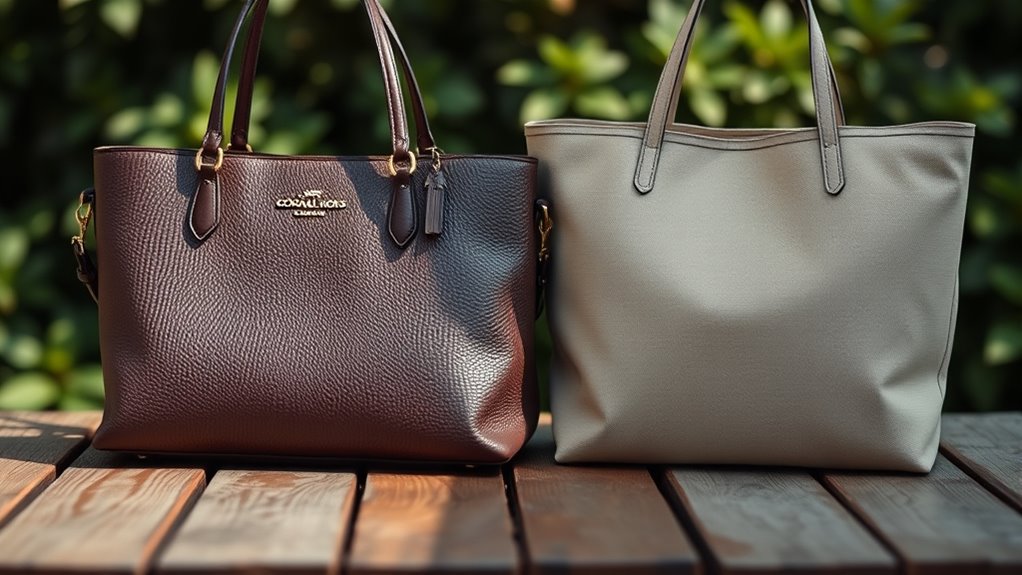
While accessibility influences your shopping experience, the brands’ commitment to sustainability and ethical practices can also sway your decision. Both Coach and Michael Kors are making strides in ethical sourcing and supply chain transparency, but their approaches vary. Coach emphasizes eco-friendly materials and fair labor practices, ensuring their supply chain is transparent. Michael Kors is also investing in sustainable initiatives, though some critics argue their transparency isn’t as comprehensive.
Key points include:
- Ethical sourcing of materials
- Transparency in their supply chains
- Use of sustainable production methods
- Fair labor practices
- Environmental impact reduction efforts
Your choice may hinge on which brand aligns more with your values regarding environmental responsibility and ethical sourcing.
Overall Value and Investment Potential
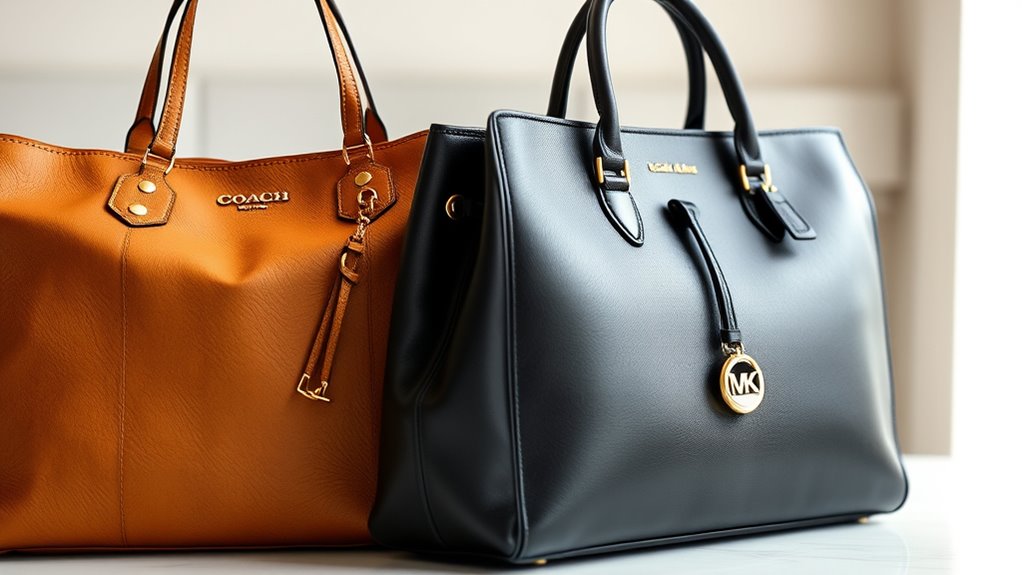
Considering overall value and investment potential, both Coach and Michael Kors offer strong brand recognition and market stability, but their long-term growth prospects differ. Coach benefits from a higher luxury perception, which can boost its resale value and appeal to collectors. Its strategic celebrity collaborations often elevate the brand’s desirability and create buzz, enhancing investment potential. Michael Kors, while still popular, leans more toward accessible fashion, which may limit its luxury perception and future appreciation. If you’re seeking a brand with better long-term investment prospects, Coach’s elevated status and exclusive collaborations give it an edge. However, both brands remain solid choices for those wanting style and stability, but Coach’s positioning as a more premium label could pay off more down the line.
Frequently Asked Questions
How Do Coach and Michael Kors Compare in Resale Value?
You’ll find that Coach generally has a stronger resale value, thanks to its brand reputation for quality and timeless design. Michael Kors, while popular, tends to depreciate faster because of its trend-driven pieces. If resale value matters to you, you’ll want to focus on Coach’s classic, design innovation-driven items that hold their worth over time, making them smarter investments as fashion cycles evolve.
Which Brand Offers Better After-Sales Service and Warranty?
You’re often told to look before you leap, and that’s true for after-sales service and warranties. Coach generally offers better customer support and more extensive warranties, giving you peace of mind. Their focus on product durability means your investment lasts longer, and their responsive service makes handling issues smoother. With Coach, you’re more likely to get the support you need, making it a safer bet for quality and peace of mind.
Are There Exclusive Collaborations or Limited Editions From Either Brand?
You’ll find both brands frequently release Limited Editions and Brand Collaborations, adding exclusivity and unique appeal. Coach often partners with artists and designers for special collections, while Michael Kors collaborates with celebrities and influencers for limited runs. These collaborations make their pieces more collectible and stylish. Keep an eye on their official sites or social media to catch upcoming releases, as these limited editions often sell out quickly and offer great value for collectors.
How Do Seasonal Collections Impact Long-Term Value?
Seasonal trends can influence your bags’ appeal now, but for long-term value, focus on investment longevity. Choosing timeless designs over fleeting seasonal trends ensures your pieces stay stylish and retain value over time. When you prioritize classic styles, you’re less affected by changing trends, making your investment more sustainable. So, consider how a piece’s versatility and enduring appeal align with seasonal shifts to maximize its long-term worth.
Which Brand Has a Stronger Presence in Global Markets?
You’ll notice that Michael Kors has a stronger presence in global markets because of its strategic market penetration and widespread luxury branding. Its accessible price point attracts diverse consumers worldwide, boosting its visibility. Coach, while also expanding, tends to focus more on North American markets. If you’re evaluating brands for international reach, Michael Kors’s aggressive global push makes it stand out in terms of market presence.
Conclusion
When you weigh Coach and Michael Kors, think of them as two different melodies—one classic, the other trendy. Coach offers timeless harmony, blending craftsmanship with lasting value, while Kors dances to the latest beats, offering fleeting excitement. Your choice shapes your style story—will it be a steady, enduring tune or a sparkling, momentary hit? Ultimately, selecting the right brand is like planting a seed; nurture it, and it’ll grow into a reflection of your true self.
